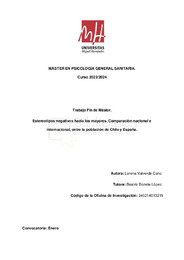Please use this identifier to cite or link to this item:
https://hdl.handle.net/11000/33981Full metadata record
| DC Field | Value | Language |
|---|---|---|
| dc.contributor.advisor | Bonete López, Beatriz | - |
| dc.contributor.author | Valverde Cano, Lorena | - |
| dc.contributor.other | Departamentos de la UMH::Psicología de la Salud | es_ES |
| dc.date.accessioned | 2024-11-21T13:13:53Z | - |
| dc.date.available | 2024-11-21T13:13:53Z | - |
| dc.date.created | 2024-01 | - |
| dc.identifier.uri | https://hdl.handle.net/11000/33981 | - |
| dc.description.abstract | Los estereotipos han sido y son fuertes creencias que afectan a la sociedad de una manera demoledora en muchos casos, en especial cuando hablamos de estereotipos negativos. Tras el crecimiento de la población mayor a nivel mundial, se ve la necesidad de conocer los estereotipos negativos que la sociedad tiene hacía ellos, pero, la pregunta es, ¿pensamos todos igual sobre los mayores? Y algo más amplio, ¿entre países existen diferencias en los pensamientos negativos hacía los mayores o son compartidos? En el actual trabajo se comparan las puntuaciones obtenidas en el Cuestionario de Estereotipos Negativos hacia la Vejez (CENVE) entre hombres y mujeres de un mismo país, en este caso, España y Chile para determinar si existen diferencias significativas. Por otra parte, se realiza otra comparación entre mujeres chilenas y españolas y hombres chilenos y españoles, para determinar si existen diferencias al pertenecer a países diferentes. Tras realizar dos T-Students y un ANOVA de dos factores para realizar las comparaciones, se determinó que no existían diferencias significativas entre sexos del mismo país, pero sí entre hombres como mujeres de diferentes países. | es_ES |
| dc.description.abstract | Stereotypes have been and are strong beliefs that affect society in a devastating way in many cases, especially when we talk about negative stereotypes. After the growth of the elderly population worldwide, there is a need to know the negative stereotypes that society has towards them, but the question is, do we all think the same about the elderly? And something broader, are there differences between countries in negative thoughts towards the elderly or are they shared? In the current work, the scores obtained in the Negative Stereotypes towards Old Age Questionnaire (CENVE) are compared between men and women from the same country, in this case, Spain and Chile to determine if there are significant differences. On the other hand, another comparison is made between Chilean and Spanish women and Chilean and Spanish men, to determine if there are differences when belonging to different countries. After performing two T-Students and a two-factor ANOVA to make comparisons, it was determined that there were no significant differences between sexes from the same country, but there were between men and women from different countries. | es_ES |
| dc.format | application/pdf | es_ES |
| dc.format.extent | 25 | es_ES |
| dc.language.iso | spa | es_ES |
| dc.publisher | Universidad Miguel Hérnández de Elche | es_ES |
| dc.rights | info:eu-repo/semantics/openAccess | es_ES |
| dc.rights | Attribution-NonCommercial-NoDerivatives 4.0 Internacional | * |
| dc.rights.uri | http://creativecommons.org/licenses/by-nc-nd/4.0/ | * |
| dc.subject | estereotipo | es_ES |
| dc.subject | creencias negativas | es_ES |
| dc.subject | mayores | es_ES |
| dc.subject | comparación | es_ES |
| dc.subject.other | CDU::1 - Filosofía y psicología::159.9 - Psicología | es_ES |
| dc.title | Estereotipos negativos hacía los mayores. Comparación nacional e internacional, entre la población de Chile y España. | es_ES |
| dc.type | info:eu-repo/semantics/masterThesis | es_ES |

View/Open:
VALVERDE CANO TFM.pdf
664,32 kB
Adobe PDF
Share:
.png)
